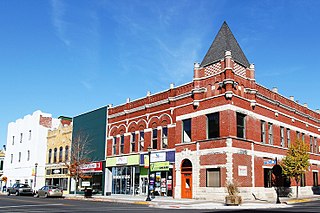
Frank Lewis O'Bannon was an American politician who served as the 47th Governor of Indiana from 1997 until his death in 2003.

The 1988 United States Senate elections was an election for the United States Senate in which, in spite of the Republican victory by George H. W. Bush in the presidential election, the Democrats gained a net of one seat in the Senate. Seven seats changed parties, with four incumbents being defeated. The Democratic majority in the Senate increased by one from 54/46 to 55/45.

The 1980 United States Senate elections coincided with Ronald Reagan's victory in the presidential election. Reagan's large margin of victory over incumbent Jimmy Carter pulled in many Democratic voters and gave a huge boost to Republican Senate candidates.

The 1964 United States Senate elections coincided with the election of President Lyndon B. Johnson by an overwhelming majority, to a full term. His Democratic Party picked up a net two seats from the Republicans. As of 2019, this is the last time either party has had a two-thirds majority in the Senate, which would have hypothetically allowed the Senate Democrats to override a veto, convict and expel certain officials, or invoke cloture without any votes from Republicans. The Senate election coincided with Democratic gains in the House in the same year.

A Massachusetts general election was held on November 7, 2006 in the Commonwealth of Massachusetts.
The Democratic Party of Indiana is the affiliate of the U.S. Democratic Party in the U.S. state of Indiana.

The Indiana gubernatorial election of 2008 was held on November 4, 2008. Incumbent Republican nominee Mitch Daniels was challenged by Democratic nominee Jill Long Thompson and Libertarian nominee Andy Horning. Daniels easily won reelection, defeating Long Thompson by over 17 points.

W. Wayne Townsend was an American politician from the U.S. state of Indiana. A Democrat, he was his party's gubernatorial nominee in 1984. Townsend was defeated by the incumbent Republican Governor Robert D. Orr in a year in which Indiana joined forty-eight other states in reelecting the Reagan-Bush ticket.

Elections were held in Indiana on Tuesday, November 2, 2010. Primary elections were held on May 4, 2010.
Elections for state and federal offices for the 2010 election cycle in Connecticut were held on Tuesday, November 2, 2010. Any necessary primary elections for the Republican and Democratic parties were held on Tuesday, August 10, 2010.

A Massachusetts general election was held on November 5, 2002 in the Commonwealth of Massachusetts.

A Massachusetts general election was held on November 3, 1998 in the Commonwealth of Massachusetts.

United States gubernatorial elections were held on November 8, 2016 in 12 states and two territories. The last regular gubernatorial elections for nine of the 12 states took place in 2012. The last gubernatorial elections for New Hampshire, Oregon, and Vermont took place in 2014, as Oregon held a special election due to the resignation of governor John Kitzhaber, while the governors of New Hampshire and Vermont both serve two-year terms. The 2016 gubernatorial elections took place concurrently with several other federal, state, and local elections, including the presidential election, Senate, and House elections.

The 2016 United States Senate election in Indiana was held on November 8, 2016, to elect a member of the United States Senate to represent the State of Indiana, concurrently with the 2016 U.S. presidential election, as well as other elections to the United States Senate in other states and elections to the United States House of Representatives and various state and local elections.

The 1996 Indiana gubernatorial Election was held on November 5, 1996, alongside the election of both houses of the Indiana General Assembly. Incumbent Governor Evan Bayh, a Democrat, was ineligible to run for a third consecutive term due to term limits set in place by the Indiana Constitution. He was succeeded by Lt. Governor Frank O'Bannon, who won election over Republican Stephen Goldsmith with 52% of the vote.

The 1992 Indiana gubernatorial Election was held on November 3, 1992. Incumbent Governor Evan Bayh, a Democrat, won reelection over his Republican challenger, Linley E. Pearson with 62% of the vote. He was the first Democratic governor of Indiana to win reelection since governors became eligible for election to consecutive terms in office in 1972.

The 2016 Indiana gubernatorial election was held on November 8, 2016, to elect the Governor and Lieutenant Governor of Indiana, concurrently with the 2016 U.S. presidential election as well as elections to the United States Senate and elections to the United States House of Representatives and various state and local elections. The primaries were held on May 3, 2016. Republican Lieutenant Governor Eric Holcomb won the race with 51.4% of the vote.

The 1980 Indiana gubernatorial election was held on November 4, 1980 in all 92 counties in the state of Indiana. Otis R. Bowen, the state's incumbent governor was ineligible for a third consecutive term due to term limits set forth in the Indiana Constitution. Robert D. Orr, the state's incumbent Republican lieutenant governor, was elected to his first term, defeating John A. Hillenbrand II, and a minor party challenger.

A Massachusetts general election was held on November 4, 1958 in the Commonwealth of Massachusetts.























